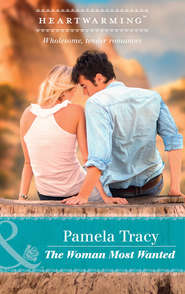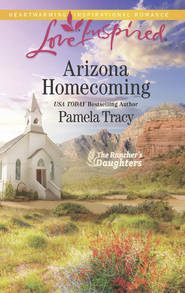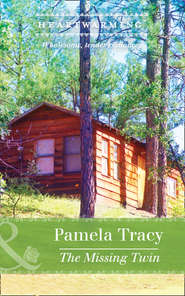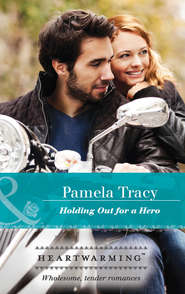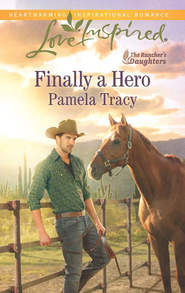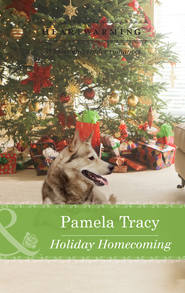По всем вопросам обращайтесь на: info@litportal.ru
(©) 2003-2024.
✖
Second Chance Christmas
Автор
Год написания книги
2019
Настройки чтения
Размер шрифта
Высота строк
Поля
Her father cleared his throat. “We’re always glad when you stop by to visit.”
He was trying. She knew that. A man accustomed to being in charge, he hadn’t taken it well when she’d broken away from his plans for her. When she’d first moved away, he’d ordered her back. When that didn’t work, he’d threatened. And, when that didn’t work, he’d cajoled. By that time she was enrolled in school and doing well. He’d admitted defeat, but not gracefully.
“How did the job interview go today?” He leaned back, a toothpick in his mouth and an attitude of good-ole-boy that worked with everyone but her.
“It went well. If I want the job, it’s mine. They gave me a week to decide.”
“Any chance Two Mules won’t lay you off?”
“No, it’s a small office. I figure it’s a matter of days, minutes even.”
“Will it really be so bad, coming back here to work?”
She thought about it, swallowed and slowly shook her head. How many times had she told a client that the best way to battle the past was to face it? She’d always felt guilty that she was giving advice she didn’t follow.
“It’s just that I was finally getting more activities for the teenagers. I had the local library doing tutoring and study groups. And—” she looked up at her dad, smiling “—I had a rancher willing to help kids get ready for rodeo competitions.” Her dad already knew this. She’d called him a dozen times asking for advice. She continued, “I just know that if the teens had something productive and active to do with their time, they’d not get in so much trouble.”
Her dad nodded. “No reason you can’t do the same here.” Elise didn’t answer. Instead, she took a big bite of her sandwich and tried to tame the turmoil in her heart.
“What if I get it started and before fruition, I’m let go? Apache Creek isn’t that big. Budget cuts could happen here, too.”
“That’s not what’s keeping you from taking the job.” Her father knew her too well. Sitting across from him now, she thought about the years he’d guided her, always giving her a safe place to land. Too many of her kids, her clients, didn’t have such a place, let alone a father.
Jacob Hubrecht still had a full head of hair, light brown and brushed to the side. His eyebrows were bushy, his mouth wide. Age had given him wrinkles, very defined. Age had also, finally, given him patience. He’d always been the bomb going off in a room, setting people scrambling to please him. Now he knew to hold the match, hold off on lighting the fuse, see what might happen.
Elise finished one sandwich and moved on to the next. Across from her, her father was already finished. Some days, he’d finish a box lunch and ask for a second or third. Other times, he grazed all day. She was the same way. It drove Eva nuts. Her big sister, the one who managed the guest services at the Lost Dutchman, was all about rules and schedules: breakfast at eight, lunch available eleven to one, dinner at six. Snacks could be bananas or crackers or something.
“It’s part of it,” Elise said. “Did you know so many kids are getting in trouble here in Apache Creek? Did you tell them to call me?”
She should have suspected his part before now. He and Mike Hamm were tight.
Dad, however, shook his head. “They called me to see if I thought you’d be willing to move back. I said they should talk to you. Even if you weren’t interested in the job, I said they should see exactly what you’re doing to find out if we could try it here. I know they’ve tossed around ideas, everything from hiring a security guard to walk the halls all the way up to instigating some sort of Scared Straight program. Every idea gets shot down.”
“Why?”
“At first, it was a money issue. Now, though, I think everyone’s willing to find money in the budget. But what’s the solution? No one’s sure. I don’t remember it being this bad when you kids were in school.”
“How bad is it?
“Jasmine Taylor ran away. She’s only seventeen. Her parents are worried sick, and no one seems to know where she is or why she ran.”
Elise said the first thing that came to mind. “Maybe she got pregnant and is afraid to tell her parents.”
“She didn’t have a boyfriend that they can figure out. She’s as shy as a mouse. Her parents say she spent more time on her horse than she did with friends. The police took the family computer and figured out that she did an internet search on running away. Her parents think she both saved and stole about three hundred dollars. She wrote them a note.”
“So they wouldn’t think she was kidnapped or murdered,” Elise murmured as she cleaned the last of the chips from her plate. Jasmine appeared to come from a nice home, plenty of food and money. But appearances could be deceiving. A nice home, plenty of food, and money were tangible entities. Emotional abuse knew how to hide in such an environment.
“And then there’s David Cagnalia,” her father continued. “His mother called me last week. She wants me to let him work here, free, so he’d get some guidance.”
“Did you agree?”
“I did. I’ve always had a soft spot for him and his little brothers. Last year, Jesse gave the younger ones riding lessons. Guess I’d better get them back here, too. It’s hard on Margaret Cagnalia, being a single mother of three boys.”
“You were a single father of three girls,” Elise pointed out.
“Don’t be getting all Brady Bunch on me.” Her dad shook his toothpick at her.
“And don’t call me Alice!” Cook shouted from the kitchen.
“We weren’t hurting financially when your mother passed on,” her father said. “I was able to hire help when I needed it. Plus, I worked where we lived. I was always available to you girls. If not me, then Cook or Harold,” he pointed out, referring to the ranch’s longtime foreman.
It was the opening Elise needed to change the subject. “I think I’ll head down to the stables. I’d like to see how Pistol’s doing, maybe visit a minute or two with Harold.” Back when she was in high school, she’d ridden Pistol every day, training for the rodeo. It was strange to think how long she’d been out of the saddle now.
“Harold would love to see you. He’s got some ideas about Pistol. You might be interested.”
“He’s not thinking about retiring and taking Pistol with him, is he?” Elise joked. There were days she’d thought about renting a stall, bringing Pistol to Two Mules. In reality, though, she usually left her trailer at six in the morning and returned at eight at night. She’d be lucky to get one ride in a week. And Pistol, a brown bay with black mane, was lively. High impulsion, her father always said. If Pistol wasn’t exercised regularly, he developed an attitude.
“That man will retire after I do,” her father said.
A few minutes later, walking down to the stables in a light rain, Elise thought about her father’s words. Jacob Hubrecht never spoke about retiring, ever. Now that Jesse, Eva’s husband, was helping more, maybe retirement was a possibility. But Jesse Campbell could never love the Lost Dutchman the way Jacob did.
The way Elise did.
She turned around, facing the main house and stared at it, soaking it in, fusing it to her memory.
It was a brown/yellow/orange mixture of color that matched the desert surrounding it and boasted a combination of Santa Fe style and Old West relic. The front porch jutted out and had what looked like tree trunks holding it up. A replica of a Conestoga wagon was to the left of the porch; a modern playground was to the right, complete with a bright blue jungle gym. The rocking chairs on the porch were new. Only the cacti looked exactly the same as they had during her childhood: hot and dry.
Her father had built most of it.
More than once, she’d heard the spiel he gave guests. “She started life as a one-room cabin. Man I bought her from had added two rooms, but neither was up to code. I added electricity, running water and furniture. A few years later, when my wife got pregnant with Eva, she insisted on a bigger house. I completed this beauty when she had my third daughter, Emily.”
Elise closed her eyes. She could remember her mother. Naomi Hubrecht had been a slender woman, brown-skinned and strong. Just like Elise. Naomi had ridden many a trail with her husband, and Jacob liked to say she was the only woman who could keep up with him.
“Until you,” he’d add, meaning Elise. On that note, Elise turned and continued down the path to the stable. With every step, she saw her past. She’d played amidst the green plants and cacti that flanked the road. Every few yards there was a swing with a canopy. She and Cooper had spent many a night looking at the stars and planning their future. The last thing she passed was a one-room schoolhouse. Judging by the laughter echoing through its walls and to her ears, Patti de la Rosa—the ranch’s secretary—was inside, doing crafts with some of the guests’ children.
A snort, the horse kind and not the human kind, welcomed her to the stable. Hay crackled a bit under her shoes. Molasses, manure and leather combined together. The sweet smell of home.
Harry Potter, one of the trail horses, was in a stall with a white bandage around his back left ankle. To this day, Elise was amazed that her father let Emily the bookworm name so many of the horses. There had been a moment when Pistol was in danger of being called Wimpy Kid.
Elise smiled. It felt good. As did the entrance to the stable that had at one time been her favorite spot.
Harold Mull looked at her when she entered, half smiled and went back to talking to Harry Potter. “Now, boy, easy does it. You’re always getting hurt. Why’d you step into the fence? And, once you stepped in, why did you keep moving until you were hurt? You could have snapped a bone.”
“He going to be all right?”
“Harry Potter,” Harold predicted, “will be fine.” Once Harold finally seemed satisfied with the horse’s bandage, he came around the front and exited the stall. Soon, Elise was in a hug that reminded her of the stable: warm, filled with the scent of molasses and leather. Harold’s hair was silver, thick, and fit his head like an upside-down bowl. His face was permanently tanned, lined and partly obscured by a full mustache. He looked intimidating and had a gruff attitude to match. In all her days, she’d never seen him hug anyone else. Just her.
The first time it had happened, she’d been eight and in Cinderella’s stall crying. She didn’t want to be in the main house. Mama wasn’t coming home, or so everyone said. The stable was much safer. Nothing had changed down here.






